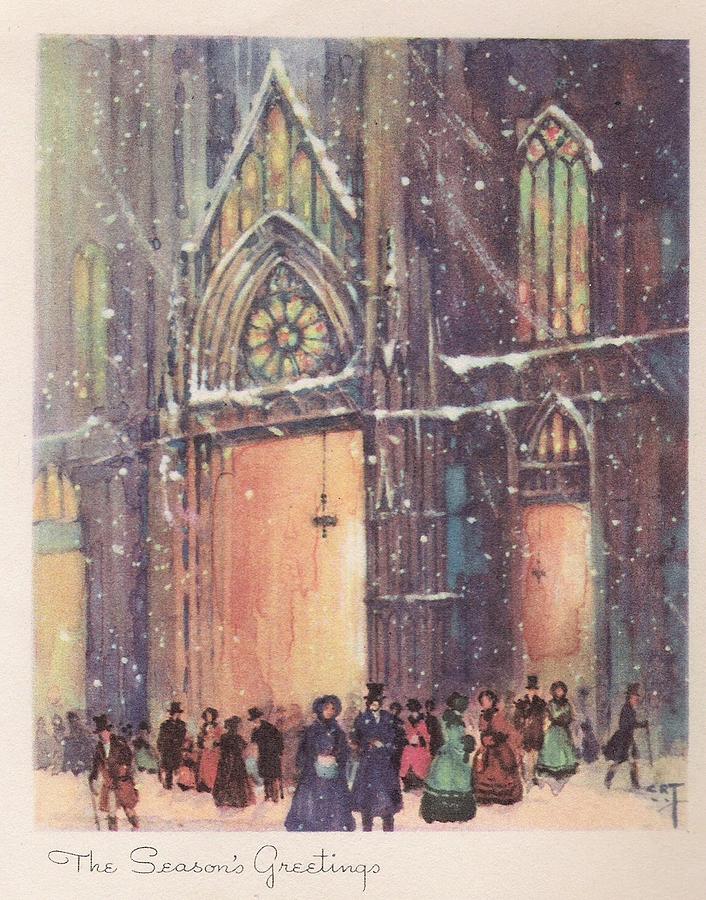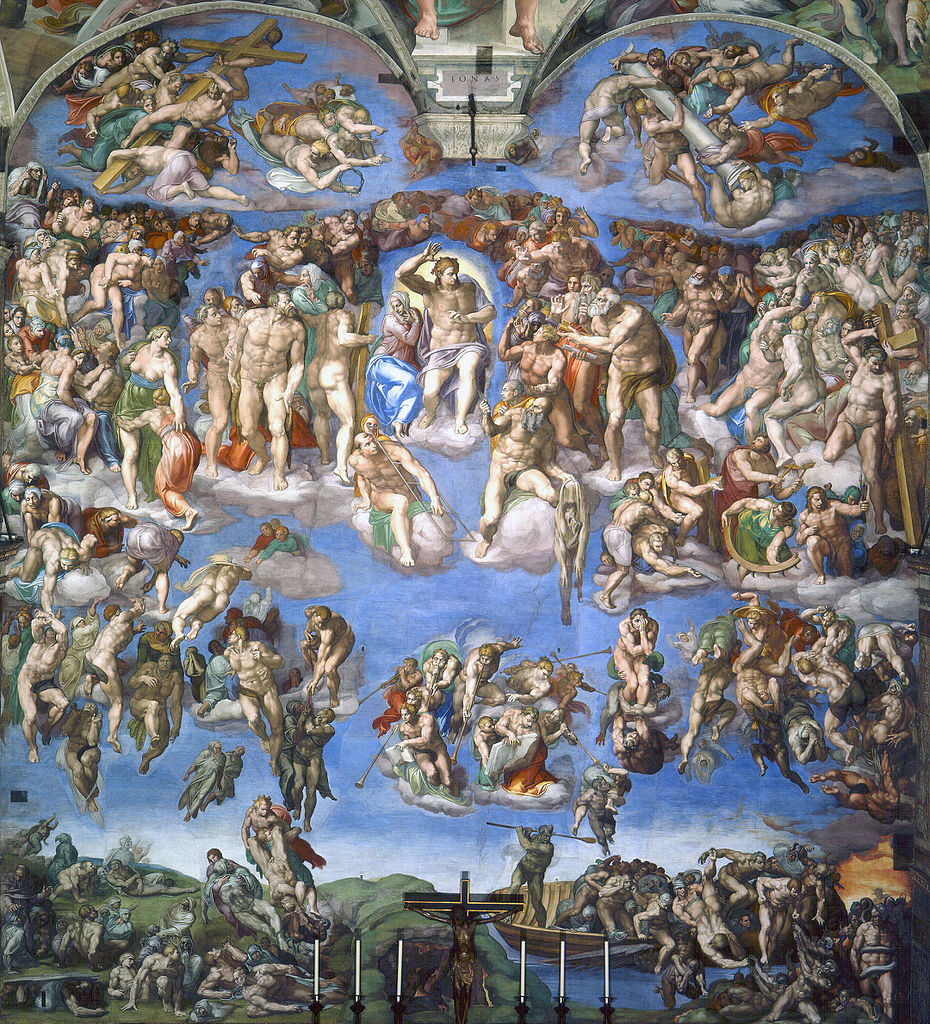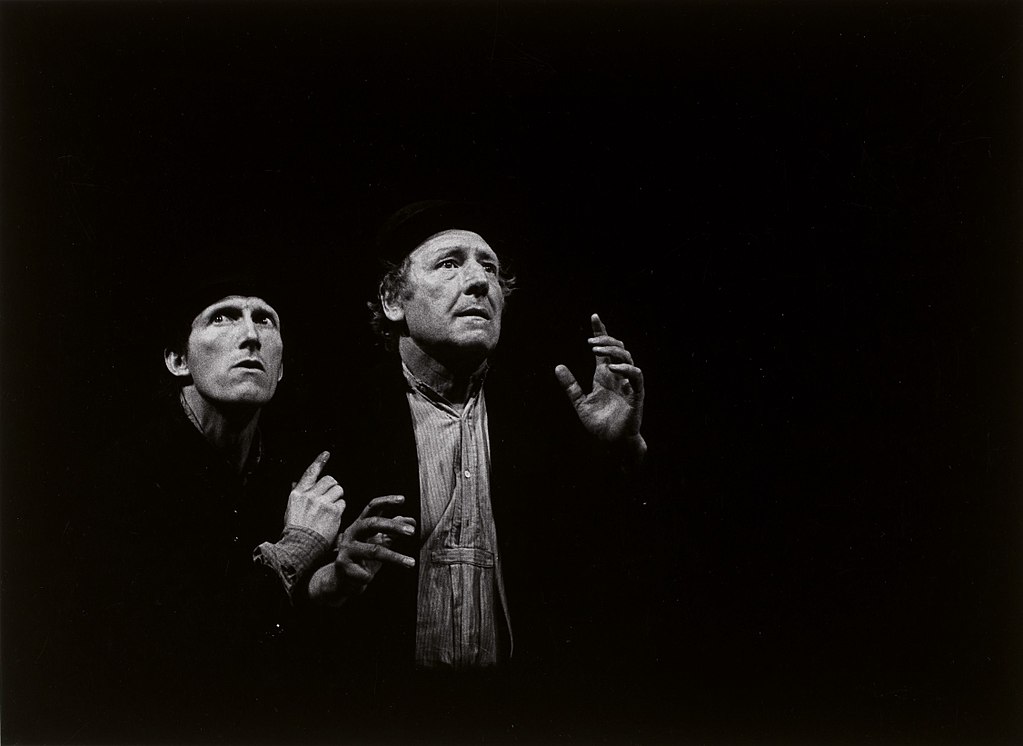Sunday in the 1st Week of Advent: Isaiah 63:16b-17, 19b; 64:2-7, 1 Corinthians 1:3-9, Mark 13:33-37.
We are reminded at the beginning of Advent that we are entering a liturgical season of special significance: one where we pare back distractions and excesses as we wait for the birth of Christ. These short days and long nights of winter are supposed to be marked by prayer, almsgiving, and acts of penance. All of this while we wait for a blessed event, often cast in a heartwarming holiday glow. But the Church is clear that this is not all that we await. Christ Himself tells us in today’s gospel reading that we are also awaiting Judgment Day and our final union with God. How many of us put this awful and awesome vision in our sights as we putter about during these 4 weeks before Christmas? It’s a reminder of what a Christian should be doing: embracing this life while achingly desiring the next life.
For me, today’s readings ask me to consider what exactly I’m waiting for during this Advent “season of waiting.” As a child, I was waiting for that great Christmas morning of gift opening with my family. As a young adult, it was the feeling of warmth as my family gathered for the holidays; later it was the re-enactment of the “magic” of Christmas morning (and the preparations and decorations along the way) for my own children. I have to admit that on the balance my Advents haven’t been terribly spiritual. Church punctuated these years of Advents sometimes as a way to punch through the ersatz Christmas haze with moments of solemnity. Other times, Church simply heightened the anticipation for Christmas; for instance, part of the experience of Christmas Eve Mass was the relief of finally getting out of those dress clothes and into pajamas, knowing that gifts and goodies came next. I can tell myself that it’s hard to stay focused on the Christ event – that is, His coming to the world in its entirety, both as a babe and as King in judgment – when the Charlie Brown Christmas album is making me want to scamper about the house with abandon. But that’s a cop-out, and so is blaming “commercialism.” As Christians, we’re called to much, much more. Part of our journey is learning the discipline required to keep God front and center.

There are many reasons to love the prophet Isaiah, and today’s first reading gives me another. He has such a clear understanding of God’s loving perfection and our dismal abilities to live upright lives on our own. The reading starts with a crystal clear lament over the dangers of free will: “You, LORD, are our father, our redeemer you are named forever. Why do you let us wander, O LORD, from your ways, and harden our hearts so that we fear you not?” Isaiah identifies God’s plan and permission that we have the freedom to wander from His ways and even choose to harden our hearts against Him. Isaiah asks the question that a holy man must ask: why? In other words, if you love God with all of your heart, mind, and soul, then you despise the worldly temptations that lead away from God. Wouldn’t it be better if we didn’t have those temptations or if we weren’t so easily distracted from our father and source? But God is not a tyrant; He grants us the free will to cook our own goose if we choose to.
And cook our own goose we do! Isaiah is blunt in his assessment of how successful we’ve been with this free will of ours: “all of us have become like unclean people, all our good deeds are like polluted rags; we have all withered like leaves, and our guilt carries us away like the wind.” Two fascinating images here – the first is the uncleanliness of who we are, so much so that even what we consider to be good deeds “are like polluted rags.” I believe that what Isaiah calls pollution is the prideful belief in ourselves as authors of goodness soiling our actions. The scriptures remind us again and again that all good comes from God, not from us. When we wander from Him and do not “fear” him (i.e., revere Him as the author of all goodness), we pollute our good deeds by believing that we are creating goodness. The second image is the withering, the dying, of our souls, and the stirring image that “guilt carries us away like the wind.” Maybe because it’s autumn and I’ve been out raking leaves, but this image really touches me. Guilt, of course, requires a knowledge that what you’ve done is wrong. And as a prophet to the Chosen People, there is no room for Isaiah or his listeners to wriggle out of this one. Likewise for us, we know the revelation of our Lord Jesus Christ. We have been raised with the Good News of the gospels as our mother’s milk. Guilt should and would carry our withered husks of souls away like the wind were it not for the sacrament of Confession. Note that Isaiah also calls God “our redeemer, you are named forever,” that is, the one who rescues us from error and wipes away our sins. Before Christ, this involved rituals and sacrifices at the temple; after Christ’s great sacrifice, this entails our intentional and remorseful confession to God in the presence of a priest. Both acknowledge God’s work as redeemer.

The hard truths about our human condition lead Isaiah to implore God with a sentiment we will hear echoed by Jesus in the gospel reading: “Would that you might meet us doing right, that we were mindful of you in our ways!” I think Isaiah answers for us what we’re really waiting for during Advent: God coming to meet us. What an interesting and theologically deep event! “Would that you might meet us doing right” means that it is God who chooses the meeting at a time and place over which we have no control. We’re used to thinking that we go to meet God when we die – that’s what we hear at every funeral, after all. But here, it seems that God is actually coming here while we’re still alive. Isaiah’s words mean that we march on in our free will existence until He comes, like children running around the house while their parents are away. Will we be going to bed at a decent hour and not eating junk food? Or will we be torturing our sister and not feeding the dog?
The gospel reading comes from the 13th chapter of St. Mark’s gospel. This chapter details Christ’s words towards the end of His ministry, just before His Passion, death, and Resurrection. It is almost like the Book of Revelation in miniature – He foretells the destruction of the temple, the persecution of His disciples, a “desolating sacrilege” being set up, false Messiahs, cataclysmic events in the skies, and the stars falling from heaven. This frightening series of events culminates in: “Then they will see ‘the Son of Man coming in clouds’ with great power and glory. Then he will send out the angels, and gather his elect from the four winds, from the ends of the earth to the ends of heaven” (Mk 13:26-27). This is Christ’s return for the Final Judgment when he gathers his elect, that is, those who are to be saved. This is the context for today’s reading. This is what Jesus is referring to when He says, “You do not know when the time will come.” Jesus’s words of advice for us is to be alert and watch for this final coming. He says, “Watch, therefore; you do not know when the Lord of the house is coming, … May he not come suddenly and find you sleeping.” The unspoken but obvious bit is that we want to be part of the elect, of those who are brought to heaven to live with God forever. We do this by not “sleeping” on the job, by living out a moral life according to Christ’s teachings.

This is one way to look at Advent, reminding ourselves to watch for the end times. In this vein, we are taught that Advent is a penitential season where we pray, give alms, and practice small acts of penance (perhaps time spent in prayer or service, perhaps small deprivations of our desires to focus us on God rather than things of this world). This is spiritual training camp. What a different perspective than “I need to get my shopping done and put lights on the house!” But this is our challenge. Yes, we can live in the now, with its joys, desires, disappointments, and victories. But we have to be constantly training for that heavenly kingdom, too. We have to find time for daily prayer and giving glory to God. Otherwise, we’re sleeping on the job.
And God bless St. Paul for giving us the positivity and hope that we need when considering God coming to meet us. In the second reading, he reminds us that “in him you were enriched in every way, with all discourse and all knowledge, as the testimony to Christ was confirmed among you, so that you are not lacking in any spiritual gift as you wait for the revelation of our Lord Jesus Christ.” He reminds us that Christ Himself has guaranteed the spiritual gifts and enrichment to prepare us for God’s coming. All we have to do is remain faithful to His teachings and invite God to accomplish His will through us. Advent sharpens the edge on our Christian lives. In the midst of our fat, jolly, and drowsy Christmas personas, we have to also be lean, sharp, and awake.
There is another way of looking at Advent, with less emphasis on the spiritual training camp aspect and more emphasis on the anticipation. I’d like to explore this through the play Waiting for Godot. For those familiar with Samuel Beckett’s celebrated tragicomedy, you’ll recall that it’s a play in two acts where nothing happens. Two men wait for Godot (whoever that is, although many see God in this character), but Godot never arrives. The play explores the human traits of forgetfulness, anxiety, over-intellectualizing, boredom, suffering, despair, nihilism, and absurdity. In the light of Isaiah’s reading today, it’s as if the characters are stuck in the wandering phase of free will, far from the light of Truth and purpose that is God. Their sometimes nonsensical banter reminds me of “polluted rags” and “withered leaves” blowing in the wind. It is possible to experience this play as a poignant truth-telling of the modern condition. While true, how sad it is! Theirs is a waiting with no real purpose, to the effect that the audience is convinced that they’d be better off not waiting at all and getting on with their lives. And this is the great sin described by the play and the worst temptation of our existence: to convince ourselves that we need not wait because no one is coming.

But the more fundamental error of the characters (if we read the play through a Christian lens) is that they do not know Godot, the one for whom they are waiting. Take this exchange, for example:
POZZO: (peremptory). Who is Godot?
ESTRAGON: Godot?
POZZO: You took me for Godot.
VLADIMIR: Oh no, Sir, not for an instant, Sir.
POZZO: Who is he?
VLADIMIR: Oh he’s a . . . he’s a kind of acquaintance.
ESTRAGON: Nothing of the kind, we hardly know him.
VLADIMIR: True . . . we don’t know him very well . . . but all the same . . .
ESTRAGON: Personally, I wouldn’t even know him if I saw him.
POZZO: You took me for him.
ESTRAGON: (recoiling before Pozzo). That’s to say . . . you understand . . . the dusk . . . the strain . . . waiting . . . I confess . . . I imagined . . . for a second . . .
POZZO: Waiting? So you were waiting for him?
VLADIMIR: Well you see—
This reveals the absurdity of waiting for someone you don’t know, yet having the meeting be important. Such a meeting creates only anxiety and questioning. This is not the type of waiting that we are called to in Advent. The concept was explained beautifully to us today by Fr. Gabriel, OP, at St. Catherine of Siena Newman Center this morning. He spoke of his childhood, when he and his brother got ready for the annual visit of their aunt, uncle and cousin. They would lay out all of their cousin’s favorite games and get everything ready so that the moment he came in, they could jump into their loving friendship with great joy. This is the type of anticipation that we might use as an analogy for the anticipation of Advent. The key is that you can’t truly anticipate someone without knowing this person already. And this is so very true of Christ. He gave the Church His Spirit so that we can know Him intimately now – in the Eucharist and sacraments, in our communal prayer as a Church, in the love that infuses the world in so many actions by the faithful. As Fr. Gabriel said, we are not waiting for a stranger or a distant judge, but for the source of love itself, our Lord Jesus Christ.
What great joy there is in this type of Advent anticipation! It encompasses and eclipses all of the giddy night-before-Christmas moments I’ve had with my brothers, sisters, and children. Waiting for the coming of love in the person of Christ is something that can completely overtake our beings, thrill us with the exciting anticipation of being a part of that love for ever.
In this light, I can be less critical of the “glow of the season.” It shares, however intentionally or tangentially, in the anticipation of the coming of love. All of that holiday cheer and joy is this love already present on earth, from people knowingly or unknowingly allowing God to work through them. Consider: generosity is perhaps the virtue we most associate with the season. Generosity is the loaves and the fishes, the Passion, the Eucharist, forgiveness and absolution. Generosity and charity are palpable acts of God in the world. In Advent, we are simply called to acknowledge God in these works and work to conform our entire lives to His commandments and will. We can’t be perfect, but we can try.
In closing, I acknowledge that part of the Advent message falls flat for most modern ears. It smacks of hard work and joyless self-flagellation. I don’t think this is the case. Advent can be joyous anticipation, but also one that recognizes that all is from God and for God. The only check on our joy must be that we don’t lose ourselves in the pleasures of this world and thoughts of ourselves – the One we wait for, the One in whom we place our joy, is Christ.
It is good to reflect on your musings Mike. The distinction of waiting – watching for someone you don’t know just shouts “absurd” in the play as you so aptly pointed out. What a great comparison to waiting and watching for someone you know, better yet love! I really liked that thought. You hit the nail on the head!
As usual I think the Old Testament too harsh and not inspiring. I much prefer to think our role in Advent is prayer, alms and penance but in a positive manner. For example, Christmas preparation is prayerful, doing things for those who represent Christ in our lives. (Many times it is penance when hard and tiresome). Music can be prayer, actions are prayers too. It all depends on your focus and intentions. This is not the easy way out, it is my way of saying you must seek God in everything you do and in everyone you love,